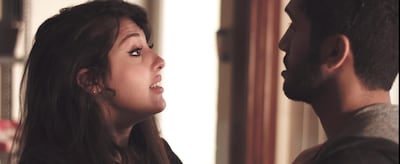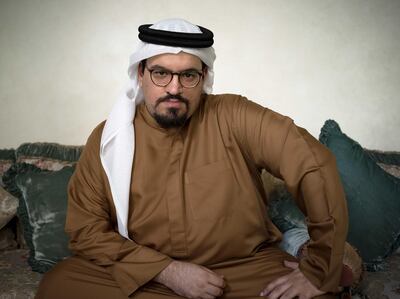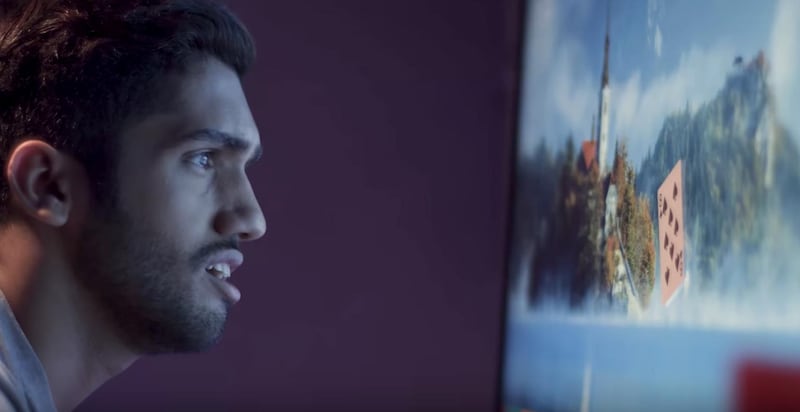Take a quick look through the names of the films in Emirati director Tariq Alkazim's back catalogue, and it becomes fairly clear that he has a love of all things dark, mysterious and macabre. You'll find that in his shorts Death Circle, The Man Who Met the Angel, Quiet and Apocalypse as well as Alkazim's debut feature A Tale of Shadows which released in UAE cinemas last year. His new film, Until Midnight, in theatres this weekend, continues the gothic theme, and it's no surprise to hear Alkazim admit that he's something of a fan of the horror genre.
“I just like to write about the things that go on in my imagination, so I guess it’s just a weird coincidence that they happen to be horror a lot,” says Alkazim. “To be fair, this one’s maybe more of a thriller, but there are definitely elements of horror there too.”
"'Elements of horror' may be something of an understatement. The film stars Emirati social media star Ahmed Khamis – who initially charmed audiences with his 2015 appearance in Arab Casting, then caused a stir when footage of his unorthodox – by UAE-standards – Fujairah wedding to his Filipina-Emirati bride went viral in May.
In Alkazim's movie, he stars, appropriately enough, as a newlywed who returns from a long trip looking forward to spending time with his bride. Instead, he finds a dark flat featuring a bizarre countdown of playing cards left in unexpected locations, a masked intruder and plenty of malicious intent. Horror is not necessarily a genre you would associate with Emirati films, although releases such as Ali Mostafa's The Worthy, Majid Al Ansari's Zinzana and Alkazim's own films have certainly pushed the boundaries in recent years.
Click below to watch the trailer:
Like his star, pushing boundaries seems to be in Alkazim’s nature. “There’s this sense that we’re still trying to figure out our own identity as a nation, but then there’s this pressure to force a certain type of our identity onto filmmakers,” the director says. “I remember once I took a script to a production company and they said ‘We like it, there’s just one thing – it doesn’t talk about culture.’ I said ‘Anything else?’ And they were, ‘No, that’s all that’s wrong.’ But if you want filmmakers to be successful and you want the local industry to be successful, you have to let them work it out for themselves, not force them to make boring movies because no one wants to see boring movies.”
'We don’t have that sense of what local cinema is'
The movie's antagonist, Nigerian actor Chuka Ekweogwu, who plays the mysterious masked assailant Ronin, is working with Alkazim for the second time after a role in A Tale of Shadows last year. He agrees with his director and is optimistic for the future. "That's true – you have Hollywood, you have Bollywood, they have a real sense of what they are. They're almost like a brand. But we don't have that sense of what local cinema is here yet," he says.
“You watch a Hollywood film, there’s that spectrum of what it is to be a Hollywood film. They know what colours and strokes and techniques they want to use to tell their story. It’s the same when you watch a British film, or a Bollywood film. They have that sense of uniqueness, which is something we don’t really have here yet. But give it time – it was the same in Nollywood in Nigeria when it started out, before the real investment came in. It can’t happen overnight.”

Given the actor and director’s shared opinions on the current state of UAE cinema, and the fact that this is the second time they have worked together on, you could be forgiven for assuming the pair are long-term collaborators. In fact, despite having met some years ago, Ekweogwu reveals that his initial efforts to work with Alkazim were unsuccessful. “When I first met Tariq, I was appearing in everything and anything I could,” the actor reveals.
"I'd answered an ad for extras while I was at Middlesex University in Dubai studying for an MSc. That was for Happy New Year and I got to play a scene with Jackie Shroff, and I was hooked from there. I worked on War Machine, FF7, Star Trek, I signed up to an agency and worked on TV commercials , and I volunteered at New York Film Academy Abu Dhabi, working as an actor in students' films when they needed them. That's where I first met Tariq, when I auditioned for a role in his film Apocalypse, but he turned me down. I guess it was just meant to be eventually."
There was a further NYFAAD link when the pair were finally united on set, thanks to A Tale of Shadows' producer Jenny Han, another NYFAAD alumni who had worked with both men on separate projects previously.
'We have to stand together as a filmmaking community'
Clearly, Alkazim holds his time at NYFAAD in high regard. Having initially studied at Dubai’s SAE Institute, he quit, seeing SAE’s offering as “too technical” and took a course at NYFA instead. He credits the now-defunct academy as the UAE’s only option for the “creative” side of filmmaking, and clearly mourns its loss following its closure in 2016.

Alkazim is clearly a self-motivator, however, and despite the academy’s demise, as well as the loss of schemes like the Sanad grant in Abu Dhabi, the Gulf Film Festival, where many of his early films screened, and the confusion surrounding the future of the Dubai International Film Festival, where Alkazim has also screened, he refuses to be downhearted, and has a clear idea of the way forward.
“We have to stand together as a filmmaking community,” he says with conviction. “I used to be afraid to go up to someone and say ‘Do you want to do this movie with me?’ I’d be afraid of how they might react, if they’d react the wrong way. It’s not just me. I remember a friend came up to me once and said ‘Tariq, can I ask you a favour?’ Then he spent forever going ‘um, um,’ before he finally got to asking if he could borrow my camera.”
_____________________
Read more:
Hajwala 2: the follow-up to the UAE’s only million-dollar banking film is all wrapped up
IWC award-winner Layla Kaylif on shooting her film in Dubai
How Emirati filmmaker Nayla Al Khaja's passion project led her to Cannes
_____________________
The incident proved a watershed for Alkazim: “That got me thinking. If you have five people, one of them has the equipment, one of them has the cast, the extras and so on, another has all the crew and the technical people, one has the budget, one is a scriptwriter, director, whatever, the creative side of things. If all of those came together and worked together as a community, imagine where we could be. We’d be more powerful than we can imagine.”
Until Midnight premieres tonight and is in cinemas this weekend





